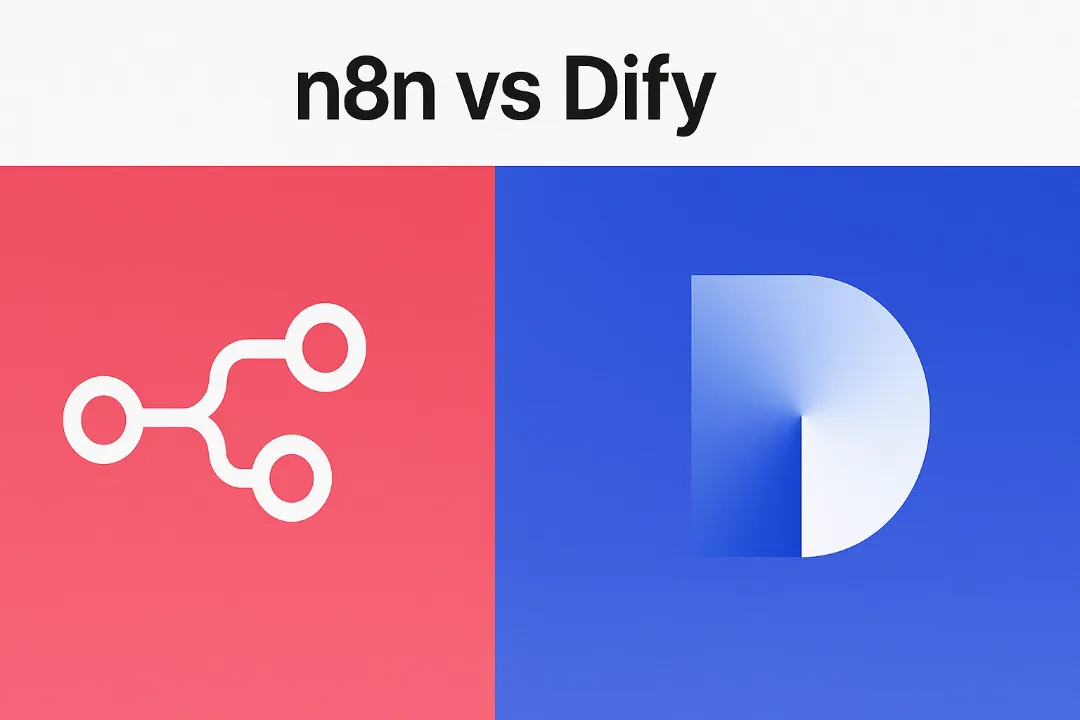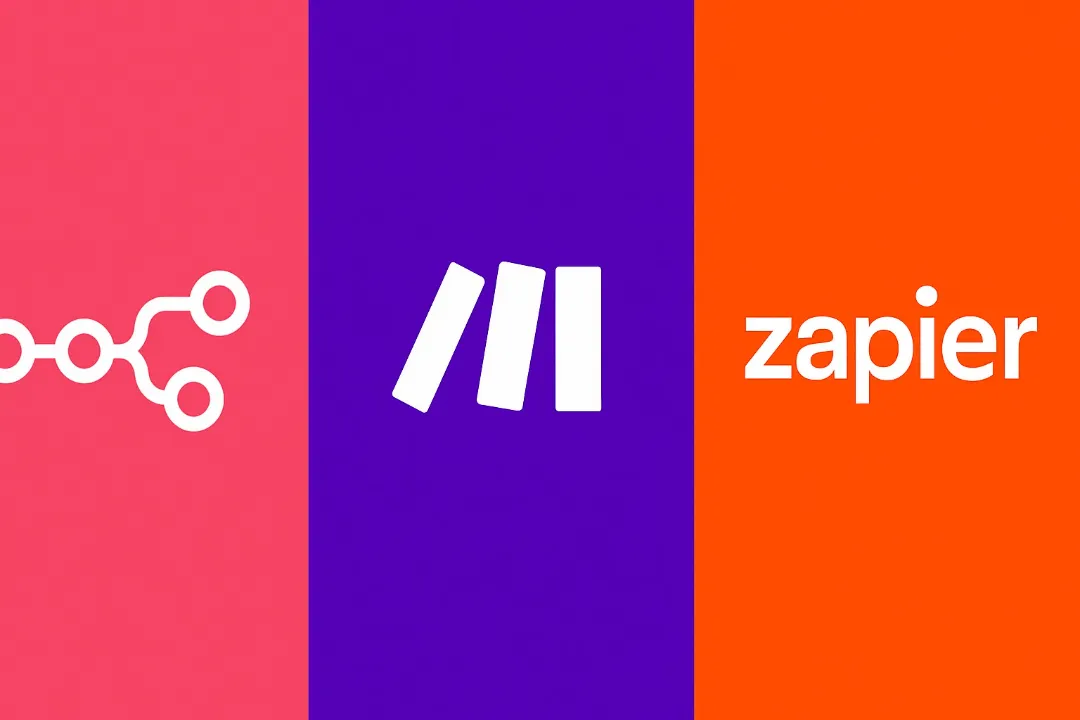
n8n vs Dify: The Ultimate Comparison Guide for Workflow Automation and AI Development (2025)
n8n vs Dify: The Ultimate Comparison Guide for Workflow Automation and AI Development (2025)
In today's fast-paced digital world, businesses are constantly seeking tools to streamline their operations and harness the power of AI. Two prominent platforms that have emerged in this space are n8n and Dify. While both tools offer automation capabilities, they cater to different needs and use cases.
As organizations continue to prioritize efficiency and innovation, understanding the distinctions between these platforms is crucial for making informed decisions. This comprehensive guide delves into the features, pricing, user experience, and ideal use cases of n8n and Dify, providing you with all the information needed to choose the right tool for your specific requirements.
TL;DR: n8n vs Dify at a Glance
| Feature | n8n | Dify |
|---|---|---|
| Primary Focus | General-purpose workflow automation | AI application development |
| Founded | 2019 | 2022 |
| Deployment Options | Self-hosted and Cloud | Cloud-only |
| AI Integration | Via third-party APIs | Native LLM support |
| User Interface | Node-based visual editor | Low-code/no-code interface |
| Pricing | Free open-source; subscription for cloud | Commercial, subscription-based |
| Best For | Developers, IT teams, custom workflow automation | Product teams, AI application builders |
| Platform Support | Cross-platform | Web-based |
| Key Strength | Extensive API integration and flexibility | Seamless LLM integration and AI templates |
What is n8n?
n8n is an open-source workflow automation platform that enables users to connect various applications and services to automate tasks and data flows. Founded in 2019, n8n has established itself as a powerful tool for developers and businesses seeking flexibility in their automation processes.
Open-source workflow automation tool with visual interface, integrating 400+ apps and services
At its core, n8n uses a node-based visual editor where each node represents an action, trigger, or service. Users can connect these nodes to create complex workflows that integrate with hundreds of services through pre-built nodes or custom JavaScript code.
The platform's key differentiator is its open-source nature, allowing for self-hosting and complete control over data and processes. For those who prefer managed services, n8n also offers a cloud solution with additional features and support.
What is Dify?
Dify is a specialized platform focused on AI application development. Launched more recently around 2022, Dify has gained attention for its ability to seamlessly integrate large language models (LLMs) into business workflows and applications.
No-code/low-code LLM application development platform with visual AI workflow, RAG pipeline, and deployment tools
The platform provides a low-code/no-code environment designed specifically for building AI-powered applications. With prebuilt templates and a user-friendly interface, Dify makes AI development accessible to a wider audience beyond technical specialists.
Dify operates exclusively as a cloud-based service, emphasizing rapid deployment and scalability for AI applications. Its specialized focus on AI integration sets it apart from more general automation platforms.
Feature Comparison: Automation Capabilities
n8n
n8n's automation capabilities are comprehensive and flexible:
- Extensive Node Library: Features over 300+ pre-built nodes for popular services and applications
- Custom Code Support: Allows JavaScript/TypeScript code for advanced logic and transformations
- Workflow Management: Supports complex branching, error handling, and conditional logic
- Triggers: Various trigger options including webhooks, scheduled events, and manual execution
- Data Operations: Robust capabilities for data transformation, filtering, and manipulation
Dify
Dify's automation capabilities are more focused on AI workflows:
- AI-Centric Automation: Optimized for AI-driven processes and applications
- Limited General Automation: Less suited for non-AI business process automation
- Template-Based Workflows: Pre-configured patterns for common AI use cases
- Specialized Triggers: Focuses on user interactions and content-based events
- Integration Capabilities: More limited in scope compared to n8n, primarily focused on AI services
"After migrating our customer support workflows to n8n, we've reduced process time by 70%. The flexibility to customize each step with JavaScript was a game-changer for our complex requirements." - Operations Director at a SaaS company
AI and LLM Integration
The integration of AI and large language models is becoming increasingly important for modern businesses. Here's how these platforms compare:
n8n
n8n approaches AI integration as an optional component:
- Third-Party AI Services: Connects with OpenAI, Hugging Face, and other AI providers via API
- Custom AI Integration: Flexibility to integrate with any AI service with an accessible API
- AI as a Node: AI capabilities are treated as another service node in workflows
- General-Purpose Architecture: Not specifically optimized for AI workloads
Dify
Dify is built from the ground up for AI and LLM integration:
- Native LLM Support: Deep integration with various large language models
- Optimized AI Workflows: Purpose-built for AI application development
- AI Templates Library: Pre-configured templates for common AI use cases (chatbots, content generators, etc.)
- LLM-Specific Features: Tools for prompt management, model fine-tuning, and context handling
User Interface and Ease of Use Comparison
| Aspect | n8n | Dify |
|---|---|---|
| Interface Type | Node-based visual workflow editor | Streamlined AI application builder |
| Learning Curve | Moderate to steep | Gentle for AI applications |
| Target User | Technical teams and developers | Both technical and non-technical users |
| Customization | Highly customizable | Template-focused with customization options |
| Documentation | Comprehensive with examples | Focused on AI use cases |
| Visual Design | Functional, technical aesthetic | Modern, user-friendly design |
Deployment Options and Infrastructure
n8n
n8n offers flexible deployment options to suit different organizational needs:
- Self-Hosted Option: Complete control over data and infrastructure
- Docker Support: Easy containerized deployment
- Cloud-Based Service: Managed option with additional features
- Enterprise Deployment: Support for high-availability setups
- Private Infrastructure: Keep sensitive data within your network
Dify
Dify takes a cloud-first approach to deployment:
- Cloud-Only Service: No self-hosting option currently available
- Managed Infrastructure: Reduces operational overhead
- Rapid Scaling: Built for variable workloads
- Limited Infrastructure Control: Less flexibility for custom deployments
- Dependency on Provider: Relies on service availability and policies
"The self-hosting option for n8n was crucial for our compliance requirements. We couldn't have moved forward with a cloud-only solution given our industry regulations." - IT Security Manager at a healthcare provider
Integration Ecosystem
A platform's ability to connect with other services is critical for effective automation. Here's how these tools compare:
n8n
n8n boasts an extensive integration ecosystem:
- 300+ Built-in Integrations: Pre-built nodes for popular services
- Custom Integrations: Ability to create custom nodes
- HTTP Requests: Connect to any service with an API
- Database Connectors: Direct integration with various database systems
- File Operations: Comprehensive file handling capabilities
- Authentication Support: Various authentication methods for secure connections
Dify
Dify focuses on AI-related integrations:
- LLM Provider Integrations: Connections to major AI model providers
- Limited General Integrations: Fewer options for non-AI services
- AI-Specific Connectors: Specialized tools for vector databases, knowledge bases
- Growing Ecosystem: Expanding list of integrations, but less comprehensive than n8n
Pricing Comparison
Pricing is often a decisive factor when choosing a platform. Let's compare the cost structures:
n8n
Multiple Pricing Options:
Open Source (Free)
- Self-hosted with full feature access
- Community support
- No usage limitations
Cloud Professional ($20/user/month)
- Managed hosting
- Priority support
- Advanced features
- Team collaboration tools
Enterprise (Custom Pricing)
- Premium support
- Custom development
- Advanced security features
- SLAs and compliance support
Dify
Subscription-Based Model:
Free Tier
- Limited monthly usage
- Basic features
- Community support
Pro ($29/month)
- Increased usage limits
- All features
- Priority support
- Multiple AI models
Business ($99/month)
- Team collaboration
- Advanced analytics
- Custom model deployment
- Premium support
Enterprise (Custom Pricing)
- Custom development
- Dedicated support
- Advanced security features
- Custom integrations
Use Cases and Ideal Users
Understanding the ideal use cases for each platform can help determine which best fits your needs:
n8n Best For:
- Data Integration Projects: ETL processes and data synchronization between systems
- API Orchestration: Complex workflows involving multiple API calls and services
- Business Process Automation: Custom workflows for specific business processes
- DevOps Automation: CI/CD pipelines and infrastructure management
- Custom Backend Processes: Specialized workflows requiring custom code and logic
Dify Best For:
- AI Chatbot Development: Building conversational interfaces powered by LLMs
- Content Generation Systems: Creating AI-driven content creation tools
- Knowledge Base Applications: Developing intelligent information retrieval systems
- Customer Support Automation: Building AI-powered support assistants
- Text Analysis Applications: Creating systems for sentiment analysis, summarization, etc.
Pros and Cons
Every platform has its strengths and limitations. Here's a balanced view of both:
n8n Pros:
- Open-source with self-hosting option for complete data control
- Extensive integration library with 300+ pre-built nodes
- Highly customizable with JavaScript/TypeScript support
- Flexible deployment options (self-hosted or cloud)
- Active community and regular updates
n8n Cons:
- Steeper learning curve for non-technical users
- Can be complex to set up and maintain when self-hosted
- Not specifically optimized for AI workloads
- Requires technical knowledge for advanced customization
- UI can be overwhelming for simple automation tasks
Dify Pros:
- Purpose-built for AI application development
- User-friendly interface accessible to non-technical users
- Excellent LLM integration and management
- Pre-built templates accelerate development
- Optimized for AI-specific use cases
Dify Cons:
- Cloud-only deployment limits control and flexibility
- Less suitable for general automation tasks
- More limited integration options compared to n8n
- Relatively newer platform with a smaller community
- Dependency on third-party AI models for advanced features
Real-World Performance: Practical Examples
To illustrate how these platforms perform in practical scenarios, let's examine two common use cases:
Scenario 1: Customer Support Workflow Automation
n8n Approach:
- Set up webhook triggers for support ticket creation
- Route tickets based on content analysis
- Integrate with CRM and knowledge base systems
- Automate follow-up emails and escalation processes
- Provide detailed analytics on resolution times
Result: Comprehensive end-to-end automation with extensive customization options, but requires significant technical setup.
Dify Approach:
- Implement AI chatbot using pre-built templates
- Train on company knowledge base and FAQs
- Set up automated responses for common questions
- Integrate with existing support systems
- Continuously improve responses based on interactions
Result: Rapid deployment of AI-powered support with minimal coding, but less control over complex process flows.
Scenario 2: Content Generation and Publishing
n8n Approach:
- Set up scheduled triggers for content generation tasks
- Integrate with AI APIs for content suggestions
- Implement approval workflows with human oversight
- Connect with multiple publishing platforms
- Track performance metrics across channels
Result: Highly customizable workflow with multiple integration points, but more complex to implement and maintain.
Dify Approach:
- Create content generation application using AI templates
- Configure tone, style, and content parameters
- Set up simple approval processes
- Connect with primary publishing channels
- Monitor content performance
Result: Quick implementation of AI-driven content generation with good quality, but less flexibility for complex publishing workflows.
User Reviews and Community Sentiment
Understanding how the broader user community experiences these platforms provides valuable insights beyond feature comparisons.
n8n Community Feedback
Overall Rating: ~4.7/5 based on community reviews
Positive Feedback:
- "The flexibility of n8n is unmatched. We've automated processes we previously thought impossible." - DevOps Engineer
- "Self-hosting option was the deciding factor for us given our data security requirements." - IT Director
- "The active community means there's always help available when you get stuck." - System Integrator
Constructive Criticism:
- "Initial setup can be challenging for those without technical backgrounds." - Marketing Automation Specialist
- "Documentation could be improved for some of the more advanced features." - Solution Architect
- "Performance can sometimes be an issue with very complex workflows." - Enterprise Developer
Dify Community Feedback
Overall Rating: ~4.5/5 based on early adopter reviews
Positive Feedback:
- "We built and deployed an AI assistant for our product in just days rather than months." - Product Manager
- "The template-based approach significantly accelerated our development cycle." - AI Application Developer
- "The user interface is intuitive enough for our non-technical team members to make adjustments." - Digital Transformation Lead
Constructive Criticism:
- "Missing some integrations that would make it more useful for our specific use case." - Enterprise Architect
- "Would appreciate more control over the underlying infrastructure." - Cloud Engineer
- "As a newer platform, it still has some stability issues to work out." - AI Solutions Provider
Security and Privacy Considerations
When implementing any automation or AI platform, security and privacy are paramount concerns:
n8n
Security Approach:
- Self-hosting option for complete data control
- End-to-end encryption for cloud version
- Granular access controls and permissions
- Compliance with major security standards
- Regular security audits and updates
Dify
Security Features:
- SOC 2 compliance (in progress)
- Data encryption in transit and at rest
- Role-based access control
- Regular security assessments
- Privacy-focused design for AI applications
"For our regulated industry, n8n's self-hosting option was the only viable solution that met our compliance requirements while still giving us the automation capabilities we needed." - Compliance Officer at a financial services firm
Making Your Decision: Which Platform to Choose?
Based on this comprehensive analysis, here are recommendations to help guide your decision:
Choose n8n if:
- You require extensive customization and flexibility in your automation
- Self-hosting and data sovereignty are important requirements
- Your team has technical expertise to leverage advanced features
- You need to integrate with a wide variety of services and systems
- General workflow automation is your primary focus, with AI as a secondary consideration
- Budget constraints make open-source options attractive
Choose Dify if:
- AI application development is your primary goal
- You prefer a low-code/no-code approach for faster development
- Your team includes non-technical stakeholders who need to participate
- You're focused specifically on LLM integration and AI workflows
- Rapid deployment is more important than infrastructure control
- You're building customer-facing AI applications like chatbots or content generators
Conclusion
Both n8n and Dify represent powerful solutions in the automation and AI development space, but they approach these challenges from different angles. n8n excels as a flexible, general-purpose workflow automation platform with extensive customization options and deployment flexibility. Dify stands out as a specialized AI application development platform that makes LLM integration accessible through a user-friendly interface.
Your choice between these platforms should be guided by your specific requirements, technical capabilities, and long-term goals. For organizations seeking comprehensive workflow automation with maximum flexibility, n8n provides a robust solution. For those focused primarily on building AI-powered applications with minimal technical overhead, Dify offers a more streamlined path.
As both platforms continue to evolve, we can expect to see further innovations that may blur these distinctions. The automation and AI landscape is rapidly changing, making it essential to periodically reassess your tooling choices to ensure they continue to meet your organization's needs.
Have you used either n8n or Dify for your projects? Share your experiences and help others make informed decisions in their automation and AI development journey.

